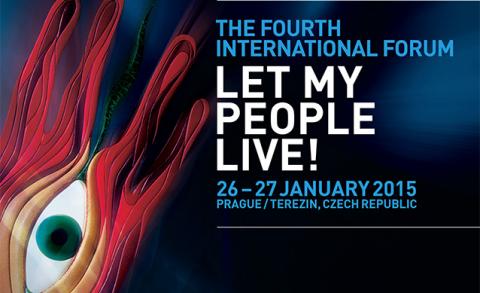The 4th International Let My people Live! Forum
Program
One-Day Conference, 26 January 2015
On 26th January, a one-day conference will be held in Prague, where three panels, comprised of representatives from government, media and world civil society, will discuss how to oppose the rise of Anti-Semitism, racism and extremism from a political, legal and public perspective.
The first panel will focus on the use of the various forms of traditional as well as social media by those who wish to promote extremist ideologies and political platforms. The panelists will discuss the dangers of incitement and hate speech as well as the limits of freedom of expression. The speakers will also attempt to address whether there is a responsibility among media and journalism professionals to ensure that their platforms do not promote intolerance, hate or demonization of minorities.
The second panel will focus on the utility of legislative measures to combat racism and hate. The panelists will address the balance of rights, responsibilities and freedoms, and how democratic societies can better protect and promote their core values of democracy, tolerance and security for all by the use of legal structures to proscribe racist or hate movements, demonstrations and publications.
The third panel will focus on how society can fight an increasing entry into the normative and mainstream body politic of extremist ideologies and the responsibility of the political class to fight this threat. Extremist groups have and are using the media, the law and the body politic to further their aims, so there is a direct responsibility by the guardians of democracy to defend these ideals against those who seek to utilize and manipulate them.
Holocaust Commemoration Event, 27 January 2015
On 27th January, Czech President Milos Zeman will host a special session for leading political figures, at Prague Castle, to discuss a roadmap towards fighting growing extremism, racism and intolerance in Europe and around the world. This will follow by the participants traveling to the city of Terezin, a former Czech concentration camp for the official commemoration ceremony.
Why Prague and Terezin
Prague and Terezin both have a strong connection to the Jewish history and the horrors of the Holocaust.
Prague was inhabited by a Jews since the 10th century and it holds an important place in Jewish history, culture and art. The Jewish community built its own city quarter, the ghetto. In the 19th century it was officially connected to Prague and renamed Josefov as a form of commemorating the emperor Joseph II for his Toleration Law granting equal rights to Jewish citizens. Prague hosts the first synagogue built in Central Europe – the Old-New synagogue from the 13th century. Some of the Jewish personalities based in Prague were influential outside Czech boundaries – for example writer Franz Kafka gained international reputation.
Terezin personifies the suffering of Czech Jews during the Holocaust. Originally a military fort from the 18th century, was used by the Nazi regime as a collecting camp and a “retirement ghetto” for Austrian and German Jews over 65 years of age. Life in the ghetto was very harsh, with tens of thousands of Jews perishing due to epidemics, malnutrition and too much workload. Terezin also served as a junction camp, from which thousands of Czechoslovak, Austrian and German Jews were sent further on to death camps in Poland.

